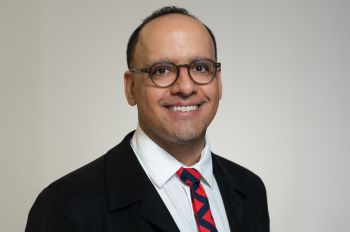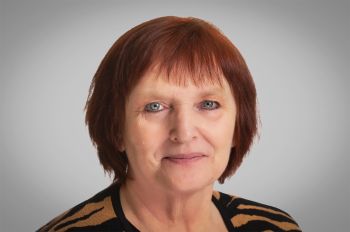Chicago-Kent Team Reaches Finals in Kurth Moot Court Championship

Arguing on the last, and most nuanced, topic of their academic experience, a pair of Chicago-Kent College of Law students advanced to the finals in a high-ranking 2022 moot court championship.
Hannah Bucher ’22 and Mia Hayes ’22 made it to the seventh and final round of the 2022 Hunton Andrews Kurth Moot Court National Championship, a late-January competition that pits the nation’s top 16 moot court teams against each other.
The pair also won the competition’s “Best Brief” title, and Bucher was named the competition’s third-best speaker.
“I think it definitely caught me by surprise when the chief judge in the final round closed the court—I got all choked up,” Hayes says, reflecting on her multi-year involvement in Chicago-Kent’s Moot Court Honors Society. “I thought, ‘Oh no, this is the last time!’ Mostly I was sad I wouldn’t get to argue with Hannah anymore. It’s such a special experience, getting to work through a problem and produce something together.”
“It is very bittersweet—the significance of that hit both of us after we finished,” Bucher agrees. “Mia’s been the best partner and friend I could have asked for through this process.”
The pair previously pulled off an impressive streak of wins to take the national William E. McGee Civil Rights Moot Court Competition title in 2021.
“What a phenomenal end to a phenomenal moot court run,” says Cherish Keller, Chicago-Kent’s director of appellate advocacy. “Finishing as finalists in what is essentially a tournament of champions is simply fantastic.”
The Kurth competition centered on a fictional U.S. Supreme Court case involving a junk food company that had engaged in an automatic dialing scheme. The company, Spicy Cold, had robocalled people at their homes and on their personal cell phones, a violation of the federal Telephone Consumer Protection Act, which prompted a private citizen to file a class action lawsuit against them.
But the company’s owner had made the company largely “judgment proof” by siphoning the business’s profits and using them for his personal expenses. Suing the company would yield little in the way of damages, but suing the owner would.
And so the teams argued whether the plaintiffs had the jurisdictional right to sue the owner and whether it could proceed as a class action suit. In their brief, the Chicago-Kent team tackled both fronts for the plaintiff.
Bucher attempted to “pierce the corporate veil”; in other words, establish that there was little legal difference between the company and its owner. The problem was, to do that under the jurisdiction of the state in which the suit was filed, the plaintiff would have to prove that Spicy Cold was created for the specific purpose of defrauding a specific person, which would be extremely difficult to argue.
So Bucher instead argued that the federal common law should apply because the case implicated significant federal interests. Under federal common law, the court would be able to pierce Spicy Cold’s corporate veil by showing that the company and owner had a “unity of interest,” using such evidence as the lack of a corporate board or any firewall between the company’s and owner’s finances.
Complicating matters was the fact that corporate law tended to defer to state law rather than federal law when there was a conflict between the two. Still, Bucher argued that the state law undermined the legislative intent of the federal Telephone Consumer Protection Act, and so federal law should be applied.
Hayes, on the other hand, defended against the owner’s attempt to deny the suit’s class action status, wherein the original plaintiff served to represent numerous other plaintiffs as a group. She argued that it wasn’t necessary for each of the unnamed members of the class action suit to individually establish jurisdiction over their claims.
Case law is somewhat conflicted on that point: the United States Supreme Court, in their 2017 Bristol-Myers Squibb Co. v. Superior Court ruling, said in a “mass action” suit (where a number of existing cases are consolidated under one), out-of-state residents had to each establish their own independent jurisdictions to be included. But multiple circuit court cases ruled that such a rule did not apply to “class action” suits where a single plaintiff is representing multiple claimants who have not already filed their own individual claims.
“It is one of the most nuanced and challenging issues either of us have ever worked on,” Bucher says.
The competition lasted seven rounds over three days. In the preliminary rounds, the team went up against University of Alabama School of Law, University of Oklahoma College of Law, St. Mary's University School of Law, and George Washington University Law School.
On the second day, they went up against University of Georgia School of Law in the quarterfinals and Stetson University College of Law in the semi-finals. Baylor Law School won out against the Chicago-Kent team in the finals.
It will be the duo’s last moot court competition together. Hayes serves as the president of Chicago-Kent's Moot Court Honors Society this year. Bucher serves as one of the vice presidents, and together they're coaching another team.
“We had a lot of really great guest judges work with us: professors, practitioners, as well as current and past members who gave us a lot of insight into how these issues work in the real world,” Bucher says. “We’re just very grateful for their time and expertise as well.”
Bucher received a philosophy degree in 2013 from Denison University in Granville, Ohio, and then worked as a paralegal in firms focusing on energy and utility law. She has worked as a judicial extern with the Illinois Appellate Court and as a legal and policy intern with the Illinois Commerce Commission. After graduation she will be joining Eimer Stahl LLP as an associate.
Hayes arrived at Chicago-Kent immediately after receiving her bachelor’s degree in English from Bradley University in Peoria, Illinois. She has interned with the Law Office of Jill M. Webb in Chicago. After graduation, she will be joining the financial markets and funds group as an associate at Katten Muchin & Rosenman LLP in Chicago.



